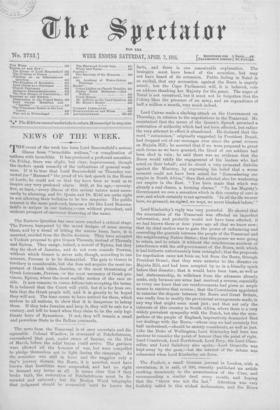Lord Kimberley's reply was very powerful. He showed that the
annexation of the Transvaal was effected on imperfect information, and probably would not have been effected, if we had known three or four years ago all that we know now; that its chief motive was to gain the power of influencing and overruling the quarrels between the people of the Transvaal and the neighbouring Native States ; that this power wo were going to retain, and to retain it without the mischievous accident of interference with the self-government of the Boers, with which it had hitherto unfortunately been entangled ; that the proposals for negotiation came not from us, but from the Boers, through President Brand ; that they were anterior to the disaster on Majuba Hill, and had been accepted by us in a friendly spirit before that disaster ; that it would. have been base, as well as bad statesmanship, to withdraw from the advances already made, only because our arms had received a reverse, especially as every one knew that our reinforcements had given us ample means to retrieve that reverse ; that the Commission appointed to examine the dispute between the Boors and Great Britain, was really free to modify the provisional arrangements made, in any way that might seem most just ; and that not only the interests of this country in South Africa, where there is a very widely prevalent sympathy with the Dutch, but also the sym- pathies of the people of England, imperatively demanded that our dealings with the Boers,—whose case we had certainly but half understood,—should be strictly considerate, as well as just.
Like the Duke of Wellington, Lord Kimberley had been less anxious to consider the point of honour than the point of right.
Lord Cranbrook, Lord Northbrook, Lord Bury, the Lord Chan- cellor, and Lord Salisbury also spoke,—Lord Granville was kept away by the gout,—but the interest of the debate was exhausted when Lord Kimberley sat down.
































